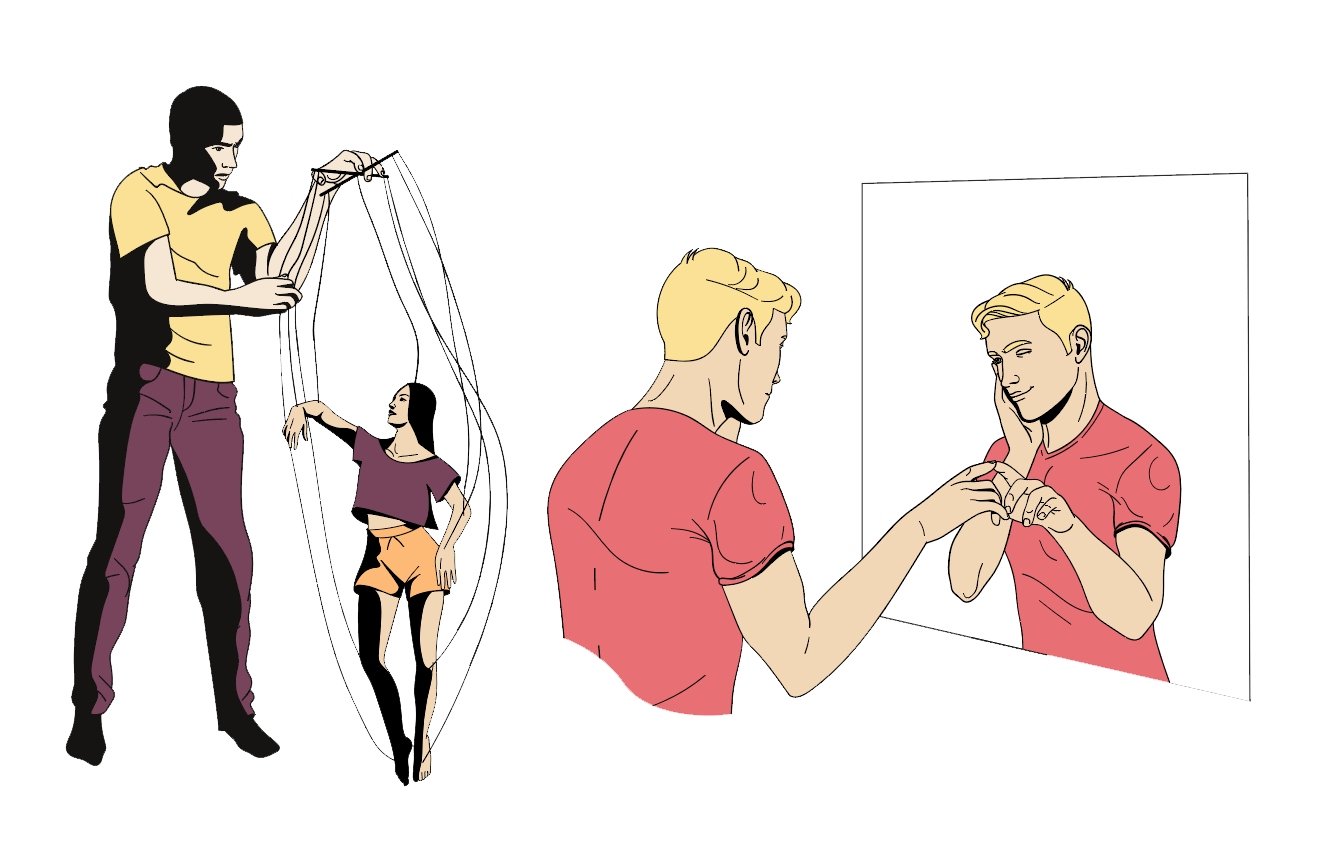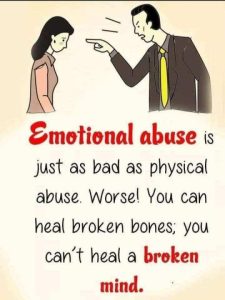If you are reading this, then you may be wondering if your husband is a narcissist. Narcissism is a personality disorder that is characterized by an inflated sense of self-importance, a need for excessive admiration, and a lack of empathy for others. If you are in a relationship with a narcissistic husband, it can be very difficult to cope. This article will provide an overview of the signs of narcissistic husbands, the impacts they have on their partners, and some tips on how to deal with them.
Contents
Understanding Narcissist Husband
A narcissist husband is one who has a personality disorder that causes him to be very self-absorbed and unable to understand other people’s feelings. He may also have an inflated sense of his own importance, which leads him to believe that he deserves special treatment and admiration from others at all times. Narcissistic husbands are often charming at the beginning of a relationship, but their true colors eventually show.
Traits of Narcissistic Husband

The following are some of the signs that you may be in a relationship with a narcissist. If your husband exhibits several of these qualities, then he may have narcissistic personality disorder:
You Feel Isolated and Alone
The narcissist’s need for control can leave you feeling isolated and alone.
Example: You may feel like you can’t talk to anyone about what is going on in your life because they will never understand. This can lead to feelings of loneliness, depression, or even suicide.
Too Fond of His Own Voice
He does not listen to you when you talk, and he only cares about his own opinions. He constantly interrupts others in conversations.
Example: If you are telling him about your day, he will interrupt and start talking about his own experiences.
Grandiose Sense of Self
He has an exaggerated sense of self-importance and thinks that he is better than other people.
Example: When you go out to eat, he will order the most expensive and extravagant dish on the menu. He believes that he deserves the best of everything.
Needs Constant Admiration
He needs constant admiration from others and becomes very unhappy if he does not receive it.
Example: If you do not praise him for doing the dishes, he may become angry or withdraw from the relationship.
Extreme Jealousy
He is very jealous and suspicious of other people, especially people who are close to you.
Example: If you talk to your male friend on the phone for more than a few minutes, he will start asking questions about what you talked about. He does not trust you and is always looking for evidence to prove that he is right.
Feels Entitled To Everything He Wants
He feels entitled to everything he wants, and he believes that the world owes him something.
Example: When you go out for dinner with your family, he will order whatever dish costs the most without thinking about how much money everyone else has spent on their own meals.
Has A Sense of Entitlement
He feels entitled to your time and attention, and he does not like it if you spend time with other people or do things that do not involve him.
Example: If you go out with friends without telling him first, he will be upset when he finds out about it.
Has A High Sex Drive
He will want to have sex with you every day, even if it means that he has to force himself on top of you or threaten your life.
Example: If he doesn’t get what wants sexually, then his anger might escalate into physical violence against you.
Use Gaslighting Techniques
Gaslighting is a technique that narcissists use to make you question your own sanity. He will constantly deny things that he has said or done, and he may even try to convince you that you are imagining things.
Example: If you catch him cheating on you, he will say that it never happened and that you are crazy for thinking it did. It is important to remember that you are not insane and that he is the one who needs help!
Total Lack of Empathy
He does not care how his actions affect other people. He is unable to understand the feelings or perspectives of others and only thinks about himself.
Example: When you tell him that you are upset because he did not help out with the kids, he will say that you are selfish. In short, he only cares about himself.
Always Wants To Be Right
Your husband can never admit when he makes a mistake. He always has to be right even if it means hurting someone else’s feelings or making them feel bad about themselves.
Example: When your children get a low grade on their math test, he will say that it is because they are lazy and not smart. He never takes any responsibility for his own actions.
Make You Feel Guilty For Your Actions
When he does something wrong, he will make you feel guilty about it by saying things like “if only you had done this then I wouldn’t have done that.”
Example: If you don’t want to have sex with him, he will say that it’s because you don’t love him anymore. He will try to make you feel like you are the one who is responsible for his bad behavior.
NOTE: There are many other ways that narcissists can negatively impact their partners’ lives, but these are just some examples. You may notice other signs or symptoms not listed here!
Living With Narcissist Husband

Life under a roof with a narcissistic husband can be worse than a hellhole. Here we will examine how living with a narcissist can affect parts of you and different areas of your life.
His Toxic Impact On You As a Person
Your Sense of Identity
When you live with a narcissistic husband, you will start to lose your sense of who you are due to their controlling behavior.
For example, if your husband is constantly telling you what clothes are appropriate for work and which ones should not be worn in public because they make him look bad, then after a while this may start affecting how confident or comfortable you feel about your own body and sense of style.
Your Self-Esteem
Living with someone who constantly puts you down will cause your self-esteem to suffer. You may start feeling that there is something wrong with yourself or that others are better than you are because they do not get criticized as much by their spouse.
Your Emotions
The way a narcissistic husband behaves can often lead to you feeling angry, frustrated, and resentful. You may find yourself constantly walking on eggshells around them in order to avoid any potential conflict or arguments.
Mental Health
If the stress of living with a narcissist becomes too much, it can lead to mental health problems like depression and anxiety. These conditions will make it even harder for you to deal with the situation at hand or find a way out of the relationship altogether.
Physical Health
Living in an abusive relationship has negative effects on your physical health as well. You may find yourself suffering from physical health problems like headaches, stomach aches, and even chronic pain.
His Toxic Impact On Your Life
Your Career
Your career can also suffer if you are constantly worried about what your husband or partner is doing at home while you’re out working. You may find yourself making mistakes on the job because of this concern for their well-being, which could lead to a loss in income and even getting fired from work altogether.
Your Financial Situation
If you are living with a narcissist, they may try to control your finances as well. They could even take away all of the money you make so that it is impossible to leave them and find somewhere else to live without their help or support system available when needed most.
Your Children’s Lives
Living with a narcissistic husband can take its toll on your children too. It may affect their self-esteem and confidence, which can lead them down the path of depression or anxiety in life later on down the road if not addressed properly now while they are still young enough that intervention is possible.
Your Friendships and Relationships
Living with a narcissistic husband can also affect your friendships and relationships. It’s hard to maintain healthy friendships when someone is constantly putting pressure on you or making demands that they know will be difficult for others to meet. You may find yourself withdrawing from social situations in order to avoid conflict altogether, which can cause people to distance themselves from you as well.
Dealing With Narcissist Husband

If you are in a relationship with this type of man, it is important to know how to deal with him. There are some things you can do to help yourself deal with your husband’s narcissistic tendencies:
Set Clear Boundaries
You need to set clear boundaries and limits on what he can and cannot do. This will allow him the freedom to act appropriately without crossing his boundaries. For instance, you can tell him that he is not allowed to criticize you in front of other people, or that he cannot come into your room without knocking first.
Do Not Engage With Him
You should not engage with him when he is angry or upset. Instead of trying to argue with him and convince him that you are right, wait for a better time to talk about it. This will allow both of you some space so that you can calm down before addressing the issue.
Speak Up For Yourself
If he is being abusive or controlling towards you, speak up and tell him that this behavior is not acceptable. Let him know that you will not put up with it and that you deserve to be treated with respect.
Do Not Take His Behavior Personally
Remember that his behavior is not about you, it is about him. He is acting this way because of his own personal issues and insecurities. Try to remember this when he starts to put you down or make you feel bad about yourself.
Talk To A Professional
It may be necessary to talk to a professional if things get too difficult for you to handle. For instance, if you feel like the relationship is becoming abusive or if your husband refuses to listen when you talk about boundaries, it might be time to seek help from a counselor or therapist.
Talking To a Professional
There are a few things to keep in mind when talking to a professional about your narcissistic husband:
Find a professional: Make sure that you find a therapist who specializes in relationships. Not all therapists will be familiar with the dynamics of a relationship with a narcissist.
Be prepared to do some work yourself: The therapist cannot fix your relationship for you – they can only help you learn how to deal with your husband’s narcissism in a healthy way.
Do not expect miracles overnight: It will take some time for both of you to adjust and get used to the new boundaries that have been set up around each other. You may need several sessions before things begin improving significantly.
Therapies For Narcissistic Husband

There are a few therapies that can help your husband if he is a narcissist. They include:
Cognitive Behavioral Therapy (CBT): This type of therapy focuses on changing the way you think about yourself and others. It teaches you how to identify negative thoughts, challenge them with evidence from reality, and replace them with more realistic, positive thoughts.
Dialectical Behavior Therapy (DBT): This type of therapy teaches you how to manage your emotions in a healthy way and helps you become more aware of what others are feeling as well.
For example, if someone is angry at you for something that happened five years ago, DBT would help teach them how to understand that the other person is still feeling the effects of that event, even if it happened a long time ago.
Marriage Counseling: If your husband refuses to go to therapy or if you are not able to get him to change his behavior, marriage counseling may be an option. This type of therapy can help you learn how to communicate effectively with your husband so that he understands what you need from him and vice versa.
Ending Marriage With A Narcissist Husband

It may be necessary for your marriage to end if he refuses therapy, and there is no hope for reconciliation. It may also be necessary if it turns into an abusive relationship. If you decide that your marriage needs to end, you should take these steps:
Make Sure You Are Ready
This is an important step – if you are not ready to end the relationship, it will not work. You need to be sure that you are doing this for yourself and not because your husband is making your life miserable. So, be prepared mentally, emotionally, and financially; at all levels possible.
Seek Professional Support
- Find a counselor or therapist: They can help you through the process of ending your marriage and dealing with your husband’s narcissism. They will have valuable insights on how to do so safely and effectively.
- Talk with a financial advisor: They help you educate about your finances and how they may change after the divorce. As well as any money issues that need addressing before splitting up assets or debts from jointly held accounts.
- Talk to an attorney: They can educate you about your rights as a spouse, parent, or ex-partner in case things get ugly. They will be able to advise you on how to proceed.
NOTE: This is especially important if there are children involved because custody arrangements often require more resources than just one home.
Move Away From Him
If possible moving away from him maybe the best solution if he is unwilling to change his ways or if the relationship is too dangerous. If you have children, it might be necessary to move away from your husband in order to protect them from any abuse or violence that may occur. This can be a difficult decision, but it may be the best thing for your family.
Reach Out To A Support Group
There are many support groups out there for people who have been in abusive relationships. These groups can provide a safe place where you can talk about your experiences and get help from others who understand what it’s like to be married to an abuser or narcissist husband. You may also find that these groups will provide you with valuable resources, such as referrals to attorneys or therapists who can help you.
Be Prepared For The Aftermath
Even after the divorce has been finalized, your husband may continue to harass you or make your life difficult. It is important that you have a plan for dealing with his behavior and know what steps to take if he tries to get back together with you again.
NOTE: If all else fails, you may have to end the marriage. It is hard to leave someone when they are unable or unwilling to change their behavior. However, if it becomes too difficult for you to continue living with them and your children are at risk of being harmed, it may be time to walk away. Always remember that you are not alone There are many women out there who have been through similar situations and survived.
Marriage Experts’ About Narcissist Husband

Dr. Karen Finn, a divorce and relationship expert, weighs in on what it is like to be married to a narcissistic husband:
“Narcissists are often charming at the beginning of a relationship. They make you feel special and important. However, as time goes on their true colors come out and they start to devalue you with insults, criticism, and even abuse. You might find yourself feeling like nothing good is ever enough for them no matter hard you try.”
“It can be hard to see what’s going on because they are so convincing at first that everything will change once this or that happens (usually something involving money). Then when things don’t change, you are left feeling even more disillusioned and hurt.
So, if you’re married to a narcissist, it’s important to get some outside support – from friends, family, or professionals. You need to start taking care of yourself and your needs in order to have any hope of changing the dynamics of your relationship.”
The Actionable Advice
“The first step is to realize that you are not crazy and that the way you’re being treated is not okay. The second step is to take action. Get some support, set boundaries, and start taking care of yourself.”
Case Study
A woman’s experience being married to a narcissistic husband
Emma* was in a relationship with a narcissist for four years before she finally decided to get divorced.
“It was really hard to leave – he always made me feel like I was the one who was wrong and that it would be my fault if anything went wrong in the relationship.
He would constantly put me down and make me feel like I wasn’t good enough for him, but he also made me feel like no one else would ever want to be with someone like me.
I tried everything I could think of: talking to friends and family about how I felt, reading books on narcissism (which helped somewhat), seeing counselors and therapists.”
“Nothing seemed like it was working until one day when I just decided that enough was enough.”
“I left him and never looked back.
It’s been almost two years since then, but I am still dealing with the fallout from being in such an abusive relationship for so long.”
The Key Message
In this case study, we see how Emma* has dealt with being married to a narcissistic husband. It was very difficult for her at first and took some time before she could finally decide what to do about it. Her experience shows us that there are ways out of these situations if we want them badly enough! So decide the best for yourself and never look back!
Movies and Books
There are several movies and books that deal with the topic of narcissism in relationships.
If you are feeling overwhelmed by your husband’s behavior, these can provide some insight and support. Some titles to consider are:
- “Disarming the Narcissist: Surviving and Thriving with the Self-Absorbed” by Wendy T. Behary, LCSW (2014)
- “Why Does He Do That?: Inside The Minds Of Angry And Controlling Men” by Lundy Bancroft (2002)
Conclusion
If you suspect that your husband may be a narcissist, it is important to seek help and learn as much as you can about the condition. There are many resources available to you, both online and in person. Don’t hesitate to reach out for help if you feel like you are struggling! If you feel like talking with someone, please contact us today. We are here to listen!
A Word From Therapy Mantra
Your mental health — Your psychological, emotional, and social well-being — has an impact on every aspect of your life. Positive mental health essentially allows you to effectively deal with life’s everyday challenges.
At TherapyMantra, we have a team of therapists who provide affordable online therapy to assist you with issues such as depression, anxiety, stress, workplace Issues, addiction, relationship, OCD, LGBTQ, and PTSD. You can book a free therapy or download our free Android or iOS app.


